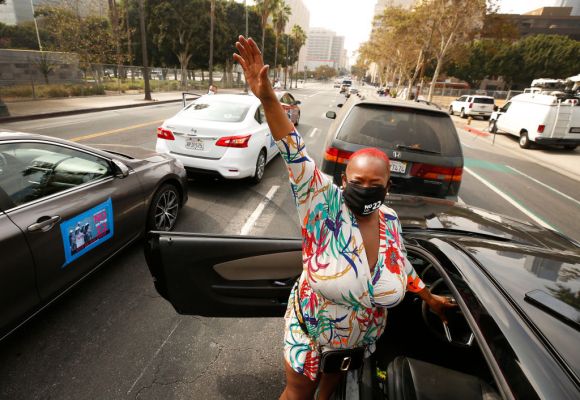Opponents of California’s Proposition 22, the measure that seeks to continue classifying rideshare drivers and delivery workers as independent contractors, filed a complaint this morning with the United States Postal Service. The No on 22 campaign alleges the Yes side is not eligible for a nonprofit postal status and is asking USPS to revoke its permit.
It’s much cheaper to send campaign mailers as a nonprofit organization. For example, sending between 1 – 200.000 small mailers to every door normally costs $0.302 per piece. As a non-profit, that costs $0.226 per piece, according to USPS. To be clear, the Yes on 22 campaign confirmed it was formed as a nonprofit organization under IRS section 501(c)(4), which pertains to social welfare organizations. But the No on 22 side says USPS erred in approving the Yes on 22 campaign.
“The Yes on 22 nonprofit permit was unlawfully issued,” a lawyer for No on 22 wrote to USPS Postmaster General Louis DeJoy. “[…] This misuse of the nonprofit permit coming from a corporate backed $200 million campaign is unprecedented and should be remedied by the Postal Service immediately.”
According to USPS, any organization that wants to send mail as a non-profit must first be authorized by the postal service as being eligible. Those that are eligible for nonprofit privileges, according to USPS, include “some political committees” but not “certain political organizations.” The political committees that may qualify for nonprofit prices regardless of nonprofit status, according to USPS, are the national or state committees of a political party, and the Democratic or Republican congressional or senatorial campaign committees.
“Campaign committees participating in ballot measure advocacy routinely form themselves as non-profits under section 501(c)(4) of the Internal Revenue Code, as the No on 22 lawyers know well,” Yes on 22 campaign spokesperson Geoff Vetter told TechCrunch. “Furthermore, the IRS granted Yes on 22’s non-profit status. As a 501(c)(4) organization, Yes on 22 is eligible for the appropriate non-profit postage rates with the USPS, which we applied for and were granted by the U.S. Postmaster. Moreover, pursuant to USPS Customer Support Ruling 128 – the USPS has a long-term policy in place of allowing the ballot measure committee of a duly authorized nonprofit to mail under the non-profit’s authorization. The above is true for many ballot measure campaigns, and as stated, like all entities, our applications were reviewed and approved by both the IRS and the USPS.”
To date, the Yes on 22 campaign has contributed $185,096,892 to its cause. The Yes on 22 committee consists of companies like Uber, Lyft, Instacart and DoorDash, as well as drivers, small businesses, and public safety and community organizations. The bulk of its funding has come from Uber, Lyft and DoorDash. In comparison, No on 22 has contributed $12,166,063.
“It’s outrageous but not surprising that the app companies that are going to the mat to keep shortchanging workers would shamelessly rip off the postal service,” No on Prop 22 spokesperson Mike Roth said in a statement. “This is just more evidence of the kind of greed we are dealing with from these companies who are spending $186 million in their selfish quest to buy themselves a new law but refused to buy their workers PPE in a pandemic.”
TechCrunch has reached out to USPS and will update this story if we hear back.
[ad_2]
Source link


